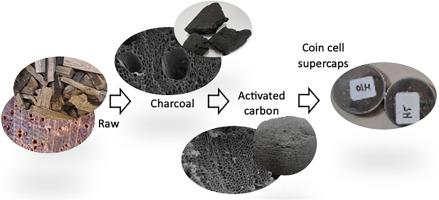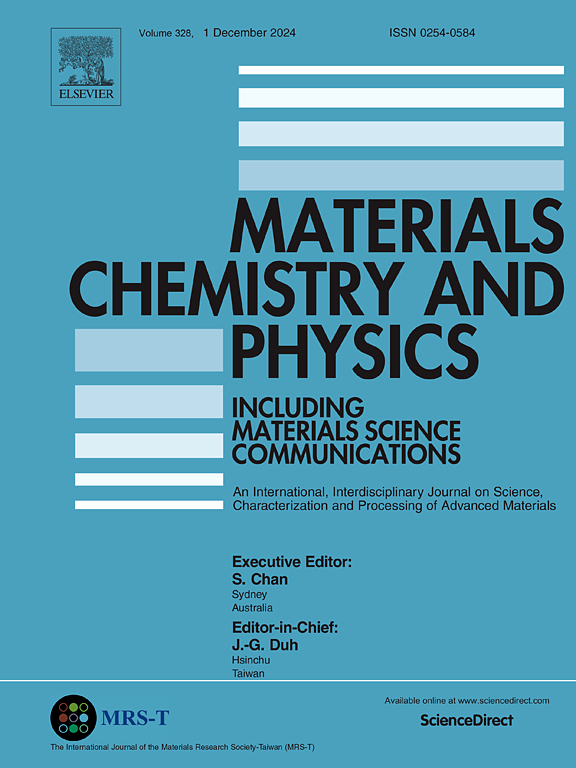利用化学活化的红色马蹄莲制备新型超级电容器及其应用
IF 4.3
3区 材料科学
Q2 MATERIALS SCIENCE, MULTIDISCIPLINARY
引用次数: 0
摘要
近年来,超级电容器已被纳入超跑装置,使其对研究人员更具吸引力。研究人员对低成本超级电容器组件的探索和开发进行了研究,以便为大规模生产做准备。目前的研究揭示了一种以新型生物质红色马蹄莲为原料的活性炭基超级电容器。活性炭是在一个容量为 3 千克的中试规模管式电动反应器中,在 800 的温度下经过 60 分钟的化学反应制得的。活性碳随后被用于组装超级电容器,其活性浆料成分分别为:活性碳、导电碳、粘合剂 80:10:10(重量比)和 LiPF6 电解液。通过近似、最终、碘吸附、表面积分析仪、X 射线衍射、红外光谱、循环伏安法(CV)和伽伐诺静态充放电法(GCD)对产品进行了表征。H 活性炭具有吸湿性并呈现晶体结构,而 NH 活性炭的吸附量和表面积最高,分别为 757 毫克/克和 627 平方米/克。CV 和 GCD 一致认为 H 型超级电容器是最佳原型,其比电容分别为 146 和 167 F/g。对比研究还进一步总结评估了以往生料中的新品种以及超级电容器制造中首选活性炭特性的适用性。结果表明,红色马蹄莲物种在这些物种中名列前茅,适用于可持续的绿色活动。本文章由计算机程序翻译,如有差异,请以英文原文为准。

Preparation and application of a novel supercapacitor from chemically activated red calliandra
In recent years, supercapacitors have been incorporated into hypercar units, making them more attractive to researchers. The exploration and development of low-cost supercap components are investigated for mass production preparation. The current study reveals an activated carbon-based supercapacitor from a novel biomass red calliandra. The activated carbon was chemically produced at 800 for 60 min in a pilot-scale tubular electric reactor with a capacity of 3 kg. Previously, the raw was soaked by phosphate (H) and ammonium (NH) compounds for 18 h. Activated carbon was then used to assemble the supercapacitor with the respective active slurry composition: activated carbon, conductive carbon, adhesive 80:10:10 (w/w), and LiPF6 electrolyte. The products were characterised by proximate, ultimate, iodine adsorption, surface area analyser, X-ray diffraction, infrared spectrum, cyclic voltammetry (CV), and Galvanostatic charge-discharge (GCD). H-activated carbon is hygroscopic and exhibits a crystalline structure, while NH-activated carbon has the highest adsorption and surface area of 757 mg/g and 627 m2/g. CV and GCD agreed to establish the H-supercap as the best prototype by exhibiting specific capacitances of 146 and 167 F/g. Comparative studies were further summarised to evaluate a novel species among the previous raws and the suitability of the preferred activated carbon characteristics for supercapacitor fabrication. The results crowned the red calliandra species at a decent rank among them and were suitable for sustainable green campaigns.
求助全文
通过发布文献求助,成功后即可免费获取论文全文。
去求助
来源期刊

Materials Chemistry and Physics
工程技术-材料科学:综合
CiteScore
8.70
自引率
4.30%
发文量
1515
审稿时长
69 days
期刊介绍:
Materials Chemistry and Physics is devoted to short communications, full-length research papers and feature articles on interrelationships among structure, properties, processing and performance of materials. The Editors welcome manuscripts on thin films, surface and interface science, materials degradation and reliability, metallurgy, semiconductors and optoelectronic materials, fine ceramics, magnetics, superconductors, specialty polymers, nano-materials and composite materials.
 求助内容:
求助内容: 应助结果提醒方式:
应助结果提醒方式:


